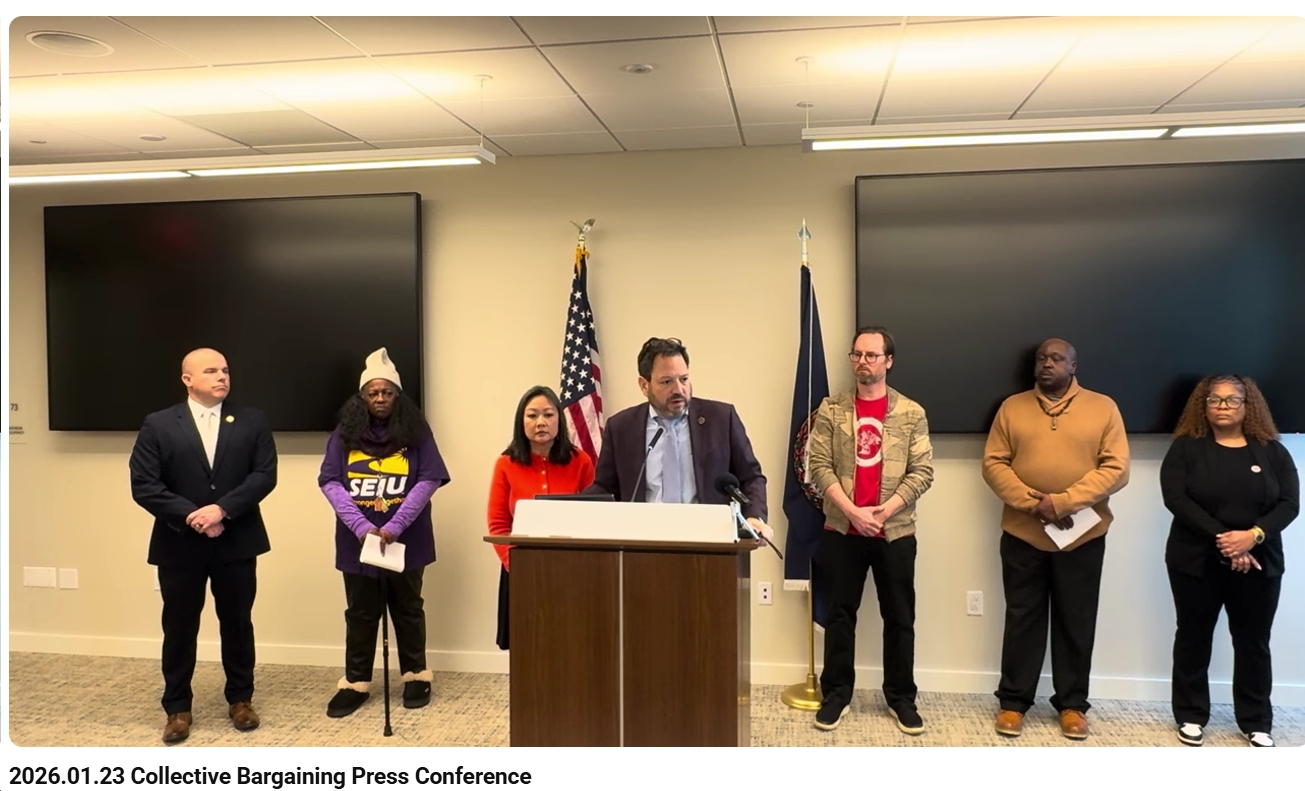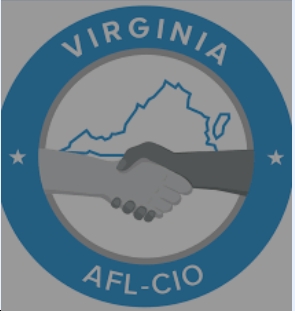by Matt Royer
If you are reading this article, you are probably already aware of the Oxfam study that found that Virginia is ranked the absolute worst state for working people in America (51st to be exact, including the District of Columbia). And while some will point to incoming Virginia Senate Majority Leader Dick Saslaw’s bill to increase the minimum wage to $15/hour by 2025 as progress, there is much, much more we need to be doing as Democrats to help the working people in the Commonwealth of Virginia.
Yes, raising the minimum wage is a great first step (although there are some valid arguments that it might be too late and minimum wage should be even higher than that), but we have to ask ourselves, what is stopping businesses from then cutting benefits in order to meet those standards? What is protecting workers from wrongful termination and wage theft? What is in place to hold employers’ feet to the fire when it comes to honoring and negotiating contracts in Virginia? Absolutely nothing.
Why is that? I’m glad you asked. During the 1940’s, after the Great Depression and as U.S. war efforts were growing, union membership among the work force skyrocketed, thanks to efforts from what were then two different organizations: the American Federation of Labor (AFL) and the Congress of Industrial Organizations (CIO). There were also employers who took exception to this, as bargaining power was expanded and workers were able to then get fair pay for a fair day’s work. Crazy, right?
Claiming to work on behalf of their workers, employers formulated several pieces of legislation against striking, saying it was too violent and a public safety concern. Their most successful law, known as the Taft-Hartley Act, was introduced following a wave of strikes in 1945 and 1946, then passed in June 1947. Working in concert with segregationists, a wave of employers claimed they wanted to protect their workers against being forced into a labor organization if they didn’t want to. But more importantly to them, at the beginning of desegregation, they explicitly wanted to protect white workers from being forced to mingle and interact with black workers. Over President Truman’s veto, Congress passed into law a bill that would allow individual states to outlaw the organizations of unions in their states for those and other reasons. These laws would become what are known today as “Right-to-Work” Laws.
Yes, you read that right. So I want you to remember that when someone says that they are somehow protecting the business sector here in the Commonwealth, making sure that we remain “the #1 state for business,” that they are actually promoting a law that has very real racist origins. At face value, that would seemingly be enough reason to repeal these laws. But there are many other ways in which working people suffer due to “Right-to-Work” laws.
Unequal Pay for Equal Work
Here’s a scenario. You have two workers in front of you, both able-bodied and capable. Both work the same number of hours a week, take the same number of breaks, have the same amount of experience, and get their work done in the same amount of time. The only difference is that one is a man and one is a woman. Without any protections or negotiations, an employer can pay that woman less than a man because the employer feels that the woman – for whatever misconceived reason – will perform at a lower level than her male counterpart.
Here’s another scenario. You have two workers, but this time, one has about an average quality of work and the second worker performs exceedingly well. Both have the same sedentary job, but the second worker has more experience than the other. The major difference is that the first worker is completely able-bodied and the second worker is wheelchair bound, although that doesn’t affect their job performance at all. Even if the second worker triples the quality of his work compared to the first worker, the employer can still pay that wheelchair-bound worker less than the able-bodied worker. Without union representation, these workers don’t have a seat at the table to dispute that practice.
Wage Theft and Slashing Benefits
Wage theft is alive and well in Virginia. Employers often fail to pay minimum wage to their employees for some of the reasons as stated in the prior section. They violate contracts by not paying workers on an agreed upon rate due to various reasons citing quality of work. But why aren’t more employers prosecuted for it? Newly elected, progressive Commonwealth’s Attorneys have put it in their platforms that they plan to prosecute these offenses more heavily. But the fact of the matter is that many workers won’t report these infringements due to fear of termination, and also because they don’t have any legal representation. So even though we may raise the minimum wage to $15, employers might not honor that law. Also, if employers do choose to honor the new minimum wage, they could possibly cut benefits, claiming that they need to save their bottom line. Union representation would protect against that.
Workers’ Compensation
Our current workers compensation laws put the burden of proof on the employee to prove that they have a rightful claim to that compensation due to a work-related injury. This compensation is difficult to receive, but legally it’s easier to prove for those with immediate physical injuries such broken bones, strained muscles, infections, etc. However, workers also have to point to a specific time and place when the injury occurred. You know who this is almost impossible to provide evidence for their work-related injuries? First responders. Let me explain.
A firefighter has to carry about 80 pounds of equipment on their person when on duty. For a career firefighter, that is years and years of lugging that around, wearing yourself down, and frequently leading to chronic pain. Do you know how difficult it is to have someone point to a specific incident at a specific time and specific location that leads to pain from years and years of wear and tear on their body? This leads to some of these people not being able to continue to work, resulting in them to lose their jobs, then their pensions, and then not being able to support their families.
I’ll do you one better. Lung cancer is one of the most common work-related injuries for first responders, due to the amount of smoke and air pollutants that they are exposed to on a daily basis. But in order to be medically covered by workers compensation, a worker would have to prove that there was a specific fire, on a specific day, with a specific quantity of chemicals and toxins in the air, at a specific measurement, at a specific time, and location, that led to their lung cancer. We don’t even know how to cure this disease or how to prevent it, but you want these people that protect you to do the investigation into when and where they first got their cancer?!?
Not only does that apply to physical injuries, but also to mental conditions like Post Traumatic Stress Disorder (PTSD). In the line of duty, police officers experience events on a daily basis that the common person probably will experience maybe once in a lifetime. This leads to prolonged mental trauma that can affect one’s job performance. While there are definite cases of specific events leading to PTSD, some officers and others in the line of duty cannot tell you exactly when their episodes started. So therefore, when they aren’t able to prove that their work caused them to have this disorder, they can’t be covered to receive the treatment they need to cope with it and then the same process happens. They miss work, they lose their jobs, lose their pension, and so on and so forth. But hey, at least that Blue Lives Matter flag you have on the back of your car lets them know you verbally support them, right?
Why Does This Matter?
Why should you care? Why don’t they just ask their employers for more money and fairer work environments? Why don’t they take these employers to court? Thanks for asking, person who clearly missed the point of this piece.
The reality is that the average working person cannot afford to miss work: not for illness, not for injury, and certainly not to be in court. In addition to that, the legal fees alone might bankrupt a person and even then, they don’t know if they would win, as many employers keep lawyers on retainer for this very reason. Most importantly, all of these practices are much more damaging to women and people of color, groups that might not have much representation in the board room. That is where unions come in.
Union representation can offer protections against everything spelled out above, as well as provide a much-needed seat at the table for collective bargaining with employers. While one person might not be able to stand up to their bosses, a collective unit of many workers voicing the same complaints can make a much-needed impact. The unions can give these workers the tools and guidance needed to make sure that they are negotiating their contracts to the fullest extent possible, while also providing them with a sense of security.
The common misconceptions and myths about unions propagated over the years have been that they can protest whenever they want to – if they simply don’t want to work, if they want to take breaks all the time, etc. – and that they can strong arm people into membership even if they don’t want to join. None of these things are true. Wildcat protests are illegal; workers have to give their employers fair warning that they plan to picket. Unions don’t just mandate breaks for their workers or negotiate pay, they negotiate health benefits, paid leave, workplace safety, and trainings for high quality of work. There is also no state law, federal law, or union mandate that can force you to join a union if you don’t want to. You might not be able to receive the full benefits that the union earns in their negotiations, but you’re not forced to fall in line with the union if you’re not in it. Bottom line, unions are not the negative stereotypes that union busters have claimed they are. Instead, unions are in place to protect workers from unethical business practices by employers.
Now, here’s where we as Democrats come in. The Democrats have always been the party of the working person in the face of Big Business. So why on earth are so many Democrats skittish about repealing a policy (“Right-to-Work”) that harms working people? On the campaign trail, many Democratic General Assembly candidates stated on their endorsement applications that they would support the repeal of “Right-to-Work” (note: according to Activate Virginia’s “whip” spreadsheet, House Democrats by a 49-2 margin, and Senate Democrats by a 12-5 margin, support repeal). But now that Democrats have won the majority and can no longer use the excuse of “well we’re in the minority, so I’m not sure that’s going to pass,” are they really going to do what it takes to pass legislation repealing anti-labor “Right-to-Work” laws in Virginia?
We have heard the talking point that we “don’t want to overreach” and squander our majority in two years. However, if we have the majority now, shouldn’t we use it to help working people? Is it really overreaching to help and protect people from unethical behavior? Are we going to continually not move on progressive issues just because some folks believe – without any hard evidence, I’d add – that we might lose in two years? And, god forbid, if we lose the majority in two years anyway, wouldn’t we have been better off just doing the right thing instead of doing nothing? More broadly, are we actually going to stand by our word and not just use working people as talking points?
For all the reasons argued above, I’m calling on all Democrats and labor advocates to push “Right-to-Work” repeal to the top of the agenda. I also encourage everyone to call on our legislators to repeal this law and move toward raising the dead-last ranking for working people here in the Commonwealth of Virginia. Going forward, in addition to being the top state for business, we must also protect our workforce, striving to be #1 in that as well. From a purely political perspective, the question is how much longer we can rely on unions and working people to get us into office if we are just going to turn our backs on them once we’re there? If we continue down this path, it’s difficult to believe that those groups to keep supporting us. If the Democrats don’t want to lose working people from our base, the answer is clear: we must repeal “Right to Work.”
To borrow a line from one 2020 Democratic presidential candidate, my generation will be the first generation to be less successful than their parents on a financial level. That is true. Stagnating wages, growing economic inequality, looming debts from the higher education system, and other economic problems will make it next to impossible for many workers to make ends meet. But we can help reverse this trend by helping people make a living wage and by enacting economic justice for all people. If you are in leadership of or a member of a progressive group, we ask you to join the Coalition to Repeal Right Work before our statement is released on December 19th and to help send a message to our legislators that we need to do more for working people here in the Commonwealth of Virginia.
—-
Matt Royer is a member of UAW, the Northern Virginia Labor Federation, and is on the steering committee of the Coalition to Repeal Right to Work. He is also the Vice President of the Arlington Young Democrats, on the steering committee of the Arlington Democrats, and a candidate for the 8th Congressional District Democratic Committee. Royer helped to push a resolution, drafted by a fellow Arlington Young Democrat, for the repeal of “Right to Work” through AYD and then to the Virginia Young Democrats. He resides in Arlington, VA and works as a campaign strategist. Opinions are his own.

![[UPDATED: VA Senate Dems Pass $15/Hour Minimum Wage Bill] VA House Democrats Pass Top Priority, Paid Sick Leave](https://bluevirginia.us/wp-content/uploads/2026/02/housedemspaidsick.jpg)















